Humidity, or the quantity of moisture in the air, can have an impact on your skin in both positive and negative ways. Humidity affects your skin in a variety of ways, including moisture, oiliness, acne and breakouts, sensitivity, fungal infections, eczema and psoriasis, and heat rash. It's crucial to note that the impact of humidity on the skin might vary depending on skin type, individual sensitivity, and environmental circumstances. If you detect any negative effects on your skin as a result of humidity, see a dermatologist for personalized advice and recommendations. Furthermore, following a consistent skincare routine that includes washing, moisturizing, and sun protection will help minimize some of the detrimental impacts of humidity.
The Science Behind Humidity and Its Effects on Skin

The effects of humidity on the skin are mostly connected to the amount of water in the air and how it interacts with the stratum corneum, the skin's outermost layer. Here's an explanation of the science underlying humidity and its effects on skin:
-
Moisture Barrier: The stratum corneum serves as a barrier between the body and its surroundings. Layers of dead skin cells are trapped in a lipid matrix. This lipid matrix aids in moisture retention and prevents excessive water loss from the skin. When the humidity level in the air is high, the stratum corneum absorbs moisture from the air, resulting in greater hydration and improved skin barrier performance.
-
Trans-Epidermal Water Loss (TEWL): The process of water evaporating from the skin's surface into the surrounding environment is referred to as TEWL. Because there is already a substantial amount of moisture in the air, high humidity levels can slow down TEWL. This helps to keep the skin hydrated, which is especially important for people who have dry or dehydrated skin.
-
Sebaceous Glands: Sebaceous glands produce sebum, an oily substance that helps lubricate the skin and hair. Humidity can have an effect on the activity of these glands. Excess moisture in high humidity conditions can cause the skin's sebaceous glands to produce more sebum, giving the appearance of increased oiliness. This is particularly noticeable in people with naturally oily or mixed skin.
-
Microbial Growth: Bacteria and fungi thrive in warm, moist environments, so high humidity promotes their growth. Increased humidity can foster the growth of microorganisms on the skin's surface, potentially leading to skin infections or exacerbating existing conditions like acne or fungal infections.
-
Skin Sensitivity: Humidity can have an impact on the stratum corneum's ability to act as a barrier. The natural equilibrium of the skin can be upset by high humidity levels, which increases the skin's susceptibility to certain substances. This increased permeability can result in heightened skin sensitivity or reactivity, leading to redness, irritation, or allergic reactions.
-
Sweating and Heat Regulation: Humidity may have an effect on the body's built-in cooling system. When the air is humid, sweat evaporates from the skin more slowly, making it more difficult for the body to effectively cool down. This may result in more perspiration and the possibility of heat-related skin conditions like heat rash or prickly heat.
What is Humidity and How Does It Affect Your Skin?
The amount of moisture or water vapor in the air is referred to as humidity. It is generally expressed as a percentage and can vary depending on factors such as climate, geography, and weather. It's crucial to note that the impact of humidity on the skin might vary depending on skin type, individual sensitivity, and environmental circumstances. Pay attention to how your skin reacts to varying degrees of humidity and alter your skincare routine accordingly.
Understanding the Relationship Between Humidity and Skin Moisture
Humidity plays a significant role in regulating skin moisture. Here's how humidity affects skin moisture and the relationship between the two:
-
Skin Barrier Function: The stratum corneum, or outermost layer of skin, works as a barrier, preventing water from escaping from the skin. It is made up of dead skin cells and a lipid matrix that aids in moisture retention. Humidity has an impact on how well the stratum corneum is hydrated.
-
Hydration: Humidity has a direct effect on skin moisture. When the air is humid, the skin absorbs moisture from the air, increasing its water content. This is especially good for people who have dry skin because it helps to replenish and maintain proper moisture levels.
-
Trans-Epidermal Water Loss (TEWL): The process of water evaporating from the skin's surface into the surrounding environment is referred to as trans-epidermal water loss. Humidity influences TEWL by changing the moisture concentration differential between the skin and the air.
-
Moisture Balance: The skin's moisture balance is critical for its health and beauty. The skin can maintain an optimal moisture level when humidity levels are adjusted. However, both low and high humidity can upset this equilibrium. Low humidity can cause dryness and dehydration, while high humidity can cause excess moisture and associated skin problems such as oiliness or acne.
-
Sensory Perception: Humidity can also have an impact on how your skin feels. The increased moisture in the air amid high humidity can cause a sensation of stickiness or clamminess on the skin. Low humidity, on the other hand, can make the skin feel tight or dry.
The Role of Humidity in Skin Barrier Function
Humidity is critical to the skin's barrier function, which refers to the skin's capacity to protect itself from external elements while also retaining moisture. Humidity affects the skin barrier function in the following ways: stratum corneum hydration, barrier function integrity, lipid barrier maintenance, and skin sensitivity. Optimal humidity levels can aid in the maintenance of a healthy skin barrier function. However, extreme humidity or continuous exposure to high humidity can have detrimental consequences for the skin, such as increased oiliness or acne. Maintaining a healthy humidity balance and following a proper skincare routine can help to maintain a healthy skin barrier.
Common Skin Issues Associated with High Humidity
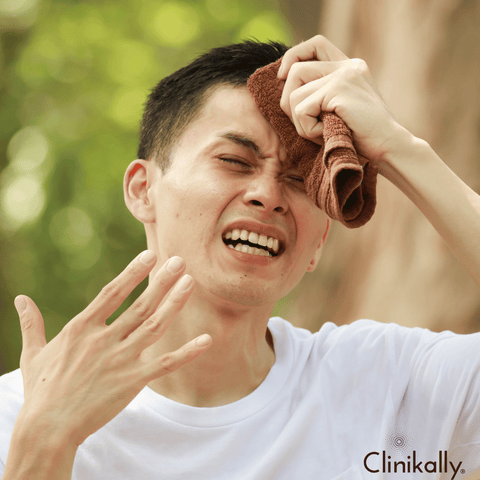
Because of the excess moisture in the air, high humidity can contribute to a variety of skin problems. Here are some of the most prevalent skin disorders caused by high humidity:
-
Acne Breakouts: Excessive humidity may make existing breakouts worse or even cause new ones. The skin's excess moisture can mix with sebum and dead skin cells to clog pores and foster the growth of bacteria that cause acne.
-
Extreme Oiliness: Humidity can cause the sebaceous glands in the skin to produce more oil, giving the skin a greasy or shiny appearance. Those who have naturally oily or combination skin may find this particularly bothersome.
-
Fungal Infections: Because fungi prefer warm, moist environments, they can grow more readily in environments with high relative humidity. Infections caused by fungi, such as athlete's foot or yeast infections, can be more common in skin folds and other moisten-prone skin areas.
-
Heat Rash: Heat rash, also known as prickly heat, can occur when hot temperatures are combined with high humidity. Bumps or blisters on the skin that are red, itchy, and caused by blocked sweat ducts. Heat rash frequently appears in covered areas, such as the neck, groyne, or underarms, or in places where skin rubs against skin.
-
Skin Irritation: Added moisture in the air can upset the skin's normal equilibrium and increase its susceptibility to irritation. In particular for people with sensitive skin or pre-existing skin conditions like eczema, this can cause redness, itching, or sensitivity.
-
Allergic Reactions: High humidity can increase allergen penetration into the skin, increasing the chance of allergic reactions. In humid conditions, pollen, dust mites, and other airborne allergens can have a stronger impact on the skin's barrier function, causing or worsening allergic responses.
Acne Breakouts and Humidity: Causes and Prevention
High humidity is one of the factors that can impact acne breakouts. Here's a rundown of the causes of acne outbreaks in connection to humidity, as well as some prevention advice:
Causes of Acne Breakouts in High Humidity:
-
Excess Sebum Production: High humidity can cause the sebaceous glands in the skin to create more sebum, the skin's natural oil. Excess sebum, in conjunction with dead skin cells and germs, can clog pores and cause acne breakouts.
-
Increased Sweat and Moisture: Sweating becomes more common in humid environments. Sweat congregates on the skin's surface with bacteria and dead skin cells, contributing to pore obstruction and acne production.
-
Prolonged Occlusion: High humidity can produce increased moisture and perspiration, resulting in skin occlusion. Occlusion occurs when the skin's surface is covered or confined, blocking appropriate ventilation and fostering bacterial growth.
Guidelines for Acne Prevention in High Humidity:
-
Cleanse Your Skin Twice Daily: To remove excess oil, sweat, and impurities, cleanse your face twice daily with a gentle, non-comedogenic cleanser. Scrubbing too hard can irritate the skin and potentially worsen acne.
-
Use Non-Comedogenic and Oil-Free Products: Choose oil-free or non-comedogenic skincare products, which are less likely to clog pores. Look for oil-free sunscreen and lightweight, water-based moisturizers.
-
Avoid Using Heavy Makeup: In high humidity, heavy makeup products can mix with sweat and sebum, congesting the pores even more. When possible, use lighter, oil-free, and non-comedogenic makeup or go makeup-free.
-
Moisturise with Caution: Even in high humidity, you may need to use a moisturizer if you have oily or acne-prone skin. Look for lightweight, non-comedogenic formulas that are designed specifically for oily or acne-prone skin.
-
Keep Your Skin Dry: After cleansing or sweating, gently pat your skin dry. Rubbing vigorously can cause skin irritation. Keeping your skin dry reduces the amount of moisture on the surface.
-
Avoid Touching Your Face: Using dirty hands to touch your face can transfer bacteria and increase the risk of acne breakouts. Avoid touching your face unnecessarily, and if you must, make sure to thoroughly wash your hands first.
-
Maintain a Healthy Lifestyle: A well-balanced diet, regular exercise, and adequate hydration all help to improve overall skin health. Acne can be reduced by eating a nutritious diet, staying hydrated, and managing stress levels.
-
Seek Professional Help: If you have persistent acne breakouts or severe acne, you should see a dermatologist. They can make personalized recommendations, prescribe medications, or recommend specialized treatments to effectively manage your acne.
Skin Sensitivity and Humidity: Triggers and Solutions
Humidity, for example, can have an effect on skin sensitivity. Here's a rundown of the causes of skin sensitivity to humidity, as well as some potential solutions:
Skin Sensitivity Triggers in High Humidity:
-
Moisture Imbalance: High humidity can disrupt the skin's natural moisture balance. Excessive moisture in the air can make the skin feel sticky or clammy, potentially leading to discomfort and skin sensitivity.
-
Increased Irritant Exposure: High humidity may compromise the skin's barrier function, making it more susceptible to irritants. Increased sweat, excess oil, and environmental pollutants can adhere to the skin's surface, potentially triggering or exacerbating skin sensitivity.
-
Fungal and Bacterial Growth: High humidity creates an ideal environment for fungi and bacteria to thrive. These microorganisms can cause skin infections, redness, and irritation, particularly in skin folds or areas where moisture accumulates.
Treatments for Skin Sensitivity in High Humidity:
-
Maintain Good Hygiene: To remove sweat, excess oil, and impurities, gently cleanse your skin with mild, fragrance-free cleansers. Hot water and harsh scrubbing should be avoided as they can aggravate sensitive skin.
-
Moisturise on a regular basis: Use lightweight, non-comedogenic moisturizers designed specifically for sensitive skin. To help calm and hydrate the skin, look for products that contain soothing ingredients such as aloe vera, chamomile, or oat extract.
-
Protect Your Skin: Use a broad-spectrum sunscreen with an SPF of at least 30 to protect your skin from harmful UV rays. Select formulas that are non-irritating and appropriate for sensitive skin. Additionally, wearing lightweight, breathable clothing can help reduce friction and irritation.
-
Avoid Irritants: Be cautious of skincare and cosmetic products that may contain irritants such as fragrances, alcohol, or harsh chemicals. To reduce the risk of skin sensitivity, choose hypoallergenic, fragrance-free, and gentle formulations.
-
Keep Skin Dry: Excessive moisture on the skin's surface can cause discomfort and sensitivity. After cleansing or sweating, use a soft towel to gently pat your skin dry. It is critical to avoid rubbing vigorously, as this can irritate the skin.
-
Use Calming Ingredients: Look for skincare products that contain calming and soothing ingredients such as chamomile, aloe vera, green tea extract, or oatmeal. These ingredients can help to reduce skin sensitivity and redness.
-
Seek Professional Help: If you have persistent or severe skin sensitivity, you should see a dermatologist. They can assess your skin, make personalized recommendations, and prescribe appropriate medications or treatments to address your specific skin issues.
Humidity-Related Skin Conditions: Identifying and Managing Them
Humidity can either cause or worsen a variety of skin diseases. Here are some of the most common humidity-related skin diseases, as well as advice for detecting and treating them:
-
Fungal Infections: A high-humidity environment promotes fungal growth on the skin. Athlete's foot, jock itch, and yeast infections are examples of common fungal illnesses. Itching, redness, and the presence of a rash or blisters are all possible symptoms. Keep the affected areas clean and dry, use antifungal creams or powders as indicated, and avoid sharing personal objects such as towels or clothing.
-
Heat Rash: Heat rash, often known as prickly heat, arises when sweat ducts become blocked, causing small, uncomfortable bumps or blisters to grow on the skin. Heat rash is more likely in places where clothing rubs against the skin or in skin folds. Heat rash can be treated by keeping the affected region cool and dry, wearing loose-fitting clothing, and applying calming creams or calamine lotion to ease itching.
-
Acne Breakouts: High humidity can aggravate acne breakouts due to increased oil production and clogged pores. Pimples, blackheads, and whiteheads are some of the symptoms. Maintain a consistent skincare routine that includes gentle cleansers and non-comedogenic products, avoid touching or picking at the acne, and consider utilizing acne-targeted treatments like benzoyl peroxide or salicylic acid.
-
Eczema Flare-ups: Eczema, also known as atopic dermatitis, is a chronic inflammatory skin disorder that can be exacerbated or induced by excessive dampness. Dry, red, itchy, or flaky skin is one of the symptoms. To control eczema, apply moderate, fragrance-free lotions or ointments on a regular basis, avoid hot baths or showers, use mild soaps or cleansers, and consult a dermatologist about topical corticosteroids or other recommended medications.
-
Prone to Irritation: High humidity levels might make skin more prone to inflammation and sensitivity. Redness, irritation, or a stinging sensation are possible symptoms. Avoid harsh or irritating skincare products, choose gentle, hypoallergenic formulations, shield your skin from excessive moisture or perspiration, and consider using soothing components such as aloe vera or chamomile to reduce skin irritation.
-
Allergic Reactions: High humidity can increase allergen penetration into the skin, thereby initiating or aggravating allergic responses. Redness, itching, hives, or swelling are all possible symptoms. Identify and avoid allergens that cause your symptoms, get medical guidance for allergy testing if necessary, and take prescribed antihistamines or topical corticosteroids as indicated to treat allergic reactions.
Maintaining Healthy Skin in Humid Conditions
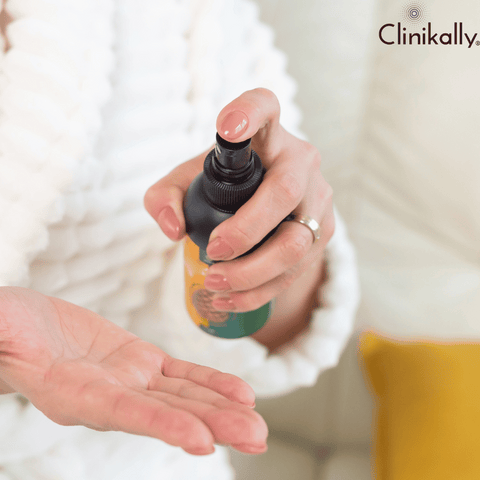
A combination of good skincare routines and lifestyle choices is necessary to maintain healthy skin in humid environments. Here are some suggestions for caring for your skin in humid conditions:
-
Cleanse Gently: Use a gentle, non-comedogenic cleanser to remove excess oil, sweat, and impurities from your skin twice a day. Avoid vigorous rubbing because it can dehydrate the skin and damage the skin barrier.
-
Moisturise Properly: Even in humid conditions, it is critical to moisturize your skin to keep it hydrated and to support the skin barrier. Choose moisturizers that are lightweight, oil-free, and non-comedogenic for your skin type. Look for ingredients that attract and retain moisture, such as hyaluronic acid or glycerin.
-
Use Sun Protection: Regardless of the weather, apply a broad-spectrum sunscreen with at least SPF 30 every day. Look for lightweight, non-greasy formulas that are designed specifically for the face. Reapply sunscreen every two hours, especially if you are out in the sun or sweating.
-
Hydrate from Within: Drink plenty of water to keep your body hydrated, which aids in maintaining the moisture balance of your skin. Hydration begins on the inside, so make sure to drink plenty of water throughout the day.
-
Avoid Heavy, Occlusive Products: In humid conditions, heavy creams or occlusive products can trap sweat and moisture on the skin, potentially leading to clogged pores or breakouts. Choose products that are lightweight and water-based, allowing your skin to breathe.
-
Wear Breathable Clothes: Choose lightweight, breathable fabrics like cotton or linen to allow air circulation and prevent excessive sweating. Avoid wearing clothing that is too tight or synthetic and can trap moisture against your skin.
-
Maintain Clean and Dry Skin: After sweating or spending time in humid environments, gently cleanse and pat your skin dry. Excess moisture can promote bacterial or fungal growth, so it is critical to keep your skin clean and dry to avoid skin problems.
-
Use Oil-Absorbing Products: If you have oily skin, consider using oil-absorbing sheets or blotting papers throughout the day to help control excess oil and shine. Excessive rubbing can cause skin irritation.
-
Avoid Touching Your Face: Touching your face with hands that may be contaminated with bacteria or irritants can aggravate skin problems. Reduce the amount of time you touch your face and wash your hands before touching your skin.
-
Maintain a Healthy Lifestyle: A healthy diet, regular exercise, and stress management can all help with skin health. Eat a nutritious diet rich in fruits, vegetables, and antioxidants, exercise regularly to improve circulation, and manage stress levels to help maintain healthy skin.
Hydration Tips for Skin in High Humidity
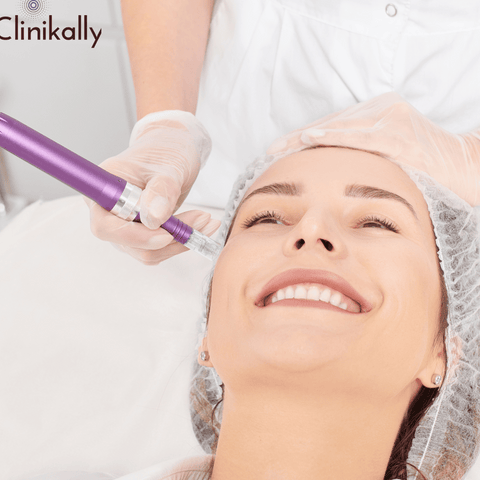
Proper hydration is still essential for maintaining healthy skin in high humidity. While the air may seem moist, this does not necessarily imply that your skin is receiving adequate moisture. Some hydration tips for skin in high humidity include drinking plenty of water, using a lightweight, hydrating moisturizer, considering hyaluronic acid, opting for hydrating face mists, avoiding long, hot showers, using humidifiers indoors, protecting your skin from the sun, avoiding excessive exfoliation, dressing in breathable fabrics, and monitoring your skin's needs. Remember that hydration is about maintaining entire body hydration through a proper water intake as well as external skincare. Be aware of your skin's needs, modify your skincare routine as needed, and listen to your skin for cues on how to keep it properly hydrated in high-humidity conditions.
Protecting Your Skin from Humidity Damage
Protecting your skin from humidity damage is critical for maintaining its health and preventing a variety of skin problems. Here are some suggestions for protecting your skin from humidity damage:
-
Cleanse and exfoliate on a regular basis: Use a gentle, pH-balanced cleanser to remove excess oil, sweat, and impurities from your skin. Exfoliation removes dead skin cells and keeps pores clear, allowing your skin to breathe and function properly. However, excessive exfoliation can cause skin irritation.
-
Use Lightweight and Breathable Skincare Products: Choose lightweight, non-comedogenic skincare products that will not clog your pores or feel heavy on your skin. Look for oil-free or water-based formulations that let your skin breathe while reducing the risk of excess oil production.
-
Hydrate Your Skin: Even if the air feels moist in high humidity, it is critical to hydrate your skin. To help keep the balance of moisture on your skin, apply a light, oil-free moisturizer. Look for ingredients that draw and hold moisture to the skin, such as hyaluronic acid or glycerin.
-
Sun protection: Wear sunscreen with at least SPF 30 to shield your skin from the damaging effects of UV rays. UV radiation can harm your skin and contribute to premature aging and other skin issues, even in humid environments. Apply sunscreen once more every two hours, particularly if you are perspiring or spending time outside.
-
Keep Hydrated: Drink enough water throughout the day to keep your body hydrated. The health and moisture levels of your skin are supported by proper hydration from within.
-
Avoid Extended Exposure to Humidity: Try to avoid spending a lot of time in overly humid environments. The natural moisture balance of your skin can be disturbed by too much moisture in the air, which can lead to skin problems. When necessary, seek out air-conditioned or well-ventilated areas.
-
Wear Breathable Clothes: Choose lightweight, breathable fabrics like cotton or linen that allow air circulation and aid in sweat prevention. Avoid wearing clothing that is too tight and can trap moisture against your skin, causing irritation or rashes.
-
Take Short, Lukewarm Showers: Long, hot showers can strip your skin of its natural oils, making it dry. Instead, take short, lukewarm showers to avoid excessive moisture loss from your skin.
-
Manage Sweat: Excessive sweating can contribute to skin problems in humid conditions. To remove excess sweat from your skin without rubbing or irritating it, use oil-absorbing sheets or blotting papers.
-
Maintain a Healthy Lifestyle: Eating a balanced diet, getting enough sleep, and managing stress levels can all improve the health of your skin. A well-rounded, healthy lifestyle benefits your overall well-being, including the resilience and ability of your skin to withstand humidity.
Adapting Your Skincare Routine for Humid Weather
Adapting your skincare routine for humid conditions is critical for maintaining skin balance and avoiding issues such as excess oiliness, plugged pores, and breakouts. Here are some tips for adjusting your skincare routine to humid conditions:
-
Cleanse with a Gentle Cleanser: Use a gentle, pH-balanced cleanser to remove excess oil, sweat, and impurities from your face twice a day. Look for a non-stripping cleanser that is specially formulated for your skin type. Avoid using harsh cleansers, which can damage your skin's natural moisture barrier.
-
Use Lightweight Moisturizers: Use lightweight, oil-free moisturizers or gel-based formulations that will not leave your skin feeling heavy or greasy. These products hydrate well without adding extra oil or contributing to a heavy, uncomfortable feeling.
-
Use Oil-Control Products: If you have oily or combination skin, consider using products designed to control excess oil. Look for ingredients that help regulate oil production and keep your skin matte, such as salicylic acid or tea tree oil. Use these products sparingly and only in areas that are prone to oiliness.
-
Hydrate with Hyaluronic Acid: Hyaluronic acid is a hydrating ingredient that attracts and retains moisture in the skin. Incorporate a hyaluronic acid serum or lightweight moisturizer into your routine to provide hydration without clogging your pores.
-
Exfoliate on a regular basis: Exfoliation removes dead skin cells and unclogs pores, allowing your skin to breathe and preventing sebum and impurities from accumulating. Use a gentle exfoliator or chemical exfoliants like AHAs or BHAs to keep your skin smooth and clear. However, excessive exfoliation can cause irritation or sensitivity.
-
Use Non-Comedogenic Sunscreen: Sunscreen is essential no matter what the weather is like. To shield your skin from damaging UV rays, choose a non-comedogenic sunscreen that is lightweight and has at least SPF 30. In order to prevent your skin from becoming overly shiny, look for sunscreens that have a matte finish or are marked as "oil-free."
-
Minimize Heavy Makeup: In humid conditions, heavy makeup can melt, clog pores, and cause breakouts. Choose products with a lighter coverage, such as mineral foundations or tinted moisturizers. Throughout the day, use oil-absorbing blotting papers to reduce shine without affecting your makeup.
Addressing Specific Concerns in Humid Environments
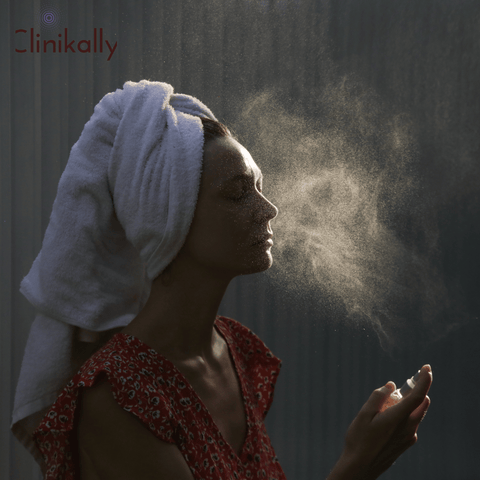
Certain skin issues might exacerbate themselves or call for special attention in humid environments. Here are some suggestions for addressing particular issues in humid weather:
-
Skin that is prone to acne: Humidity can increase oil production and clog pores, which can result in acne breakouts. Use a gentle cleanser containing salicylic acid to unclog pores and lessen inflammation when dealing with acne-prone skin in humid climates. To avoid pore clogging, use oil-free sunscreen and light, non-comedogenic moisturizers. To treat breakouts, think about using tea tree oil or benzoyl peroxide spot treatments.
-
Oily Skin: Humidity can make the condition of oily skin worse. To manage excessive sebum, use products that are oil-free and mattifying. Avoid thick creams and choose lightweight gels or moisturizers instead. Oil-absorbing sheets or blotting papers can be useful for removing extra shine throughout the day without drying out your skin.
-
Combination Skin: In humid conditions, combination skin may become uneven, with the T-zone (the forehead, nose, and chin) becoming oilier and the rest of the face remaining normal or dry. Use a mild cleanser, and use different moisturizers on various parts of your face. Apply hydrating creams to the drier areas and lightweight gels or moisturizers to the T-zone. Blotting papers can be used to control T-zone oiliness.
-
Dehydration: Your skin can still become dehydrated even in conditions of high humidity. Make sure you are hydrating your body from the inside out by drinking enough water. Use water-based, light moisturizers with hydrating components like hyaluronic acid. Hydrating facial mists can also give you a revitalizing boost all day.
-
Hyperpigmentation: Both humidity and sun exposure can make the condition worse. Use a broad-spectrum sunscreen to protect your skin and stop pigmented areas from getting darker. Use skincare products with brightening components like vitamin C or niacinamide to help lighten hyperpigmentation that is already present.
-
Sensitivity: Humidity can increase the skin's sensitivity and susceptibility to rashes. Choose gentle, fragrance-free products to reduce the risk of irritation. Avoid harsh exfoliants and active ingredients that may irritate your skin further. Keep your skin clean and hydrated to maintain its barrier function and reduce sensitivity.
Combating Excess Oil Production in Humid Climates
Excess oil production in humid regions can be a typical issue for many people. High humidity and warm temperatures can cause increased sebum production, resulting in oily skin and related concerns such as acne and plugged pores. Here are some strategies you can try to combat excess oil production in humid climates: Cleanse your skin regularly, use toners, moisturize appropriately, use oil-absorbing products, avoid heavy or occlusive products, wear sunscreen, exfoliate regularly, maintain a healthy diet, control stress levels, and consult a dermatologist. Remember that everyone's skin is different, so finding the most efficient method for regulating excess oil in a humid area may require some trial and error. To get the best results from your skincare routine, be persistent and patient.
Managing Dry Skin in High Humidity
Managing dry skin in high humidity can be difficult since the humidity makes the skin more prone to moisture. To help alleviate dryness and keep your skin hydrated, use a gentle cleanser, moisturize regularly, use a humidifier, protect your skin from the sun, avoid hot showers or baths, exfoliate gently, wear breathable fabrics, use a hydrating face mask, and consult a dermatologist. Remember to stick to your skincare program and give it time to produce results. It's also critical to pay attention to your skin's needs and alter your routine accordingly.
Reducing Inflammation and Eczema Flare-ups in Humid Weather
Reducing inflammation and treating eczema flare-ups can be difficult in humid weather since the combination of heat and moisture can aggravate symptoms. There are, however, many steps you can take to help reduce inflammation and eczema flare-ups:
-
Keep your skin cool: Try to stay in air-conditioned areas or use fans to keep your skin cool. Heat can cause excessive sweating and aggravate itching and inflammation. Wear light, loose-fitting clothing made of breathable fabrics such as cotton or bamboo.
-
Moisturise on a regular basis: Even in humid weather, moisturizing is essential for eczema-prone skin. Choose fragrance-free, hypoallergenic moisturizers or emollients and apply them while your skin is still damp after bathing or showering. This aids in moisture retention and skin barrier restoration.
-
Avoid using harsh soaps and cleansers: Use gentle, fragrance-free cleansers designed for sensitive or eczema-prone skin. Harsh soaps and cleansers can deplete the skin's natural oils, exacerbating eczema symptoms.
-
Take shorter, lukewarm showers or baths: Long, hot showers or baths can dry out the skin and aggravate eczema. To help retain moisture, limit your bathing time and use lukewarm water rather than hot water.
-
Use a gentle detergent: To avoid irritation, wash your clothes, bedding, and towels with mild, fragrance-free detergents. Avoid fabric softeners in favour of hypoallergenic alternatives.
-
Use wet wraps to keep your skin hydrated: Wet wraps can help soothe inflamed skin and provide extra hydration. After moisturizing your skin, place a damp cloth or wrap over the affected areas for a few minutes. Consult a dermatologist for advice on proper wet wrap techniques.
-
Identify and avoid triggers: Be aware of potential triggers that aggravate your eczema symptoms. These might include irritants, allergens, or specific fabrics. As much as you can, try to avoid or reduce exposure to these triggers.
-
Use corticosteroid creams or ointments: Your dermatologist may advise you to use corticosteroid creams or ointments to help control inflammation and flare-ups in more severe cases. Only take these medications as directed by your doctor, and follow all of his or her instructions carefully.
-
Use stress-reduction techniques: Finding stress management techniques is essential because stress can exacerbate eczema symptoms. Use techniques for stress management: Stress can worsen eczema symptoms, so it's important to find ways to manage stress. Engage in relaxation techniques such as meditation, deep breathing exercises, or yoga to help reduce stress levels.
-
Consult a dermatologist: It is advised to get advice from a dermatologist if your eczema symptoms continue or get worse despite your efforts to treat them. They can evaluate your condition, make tailored recommendations, and, if necessary, go over additional treatment options.
Anti-Aging Strategies for Humid Environments
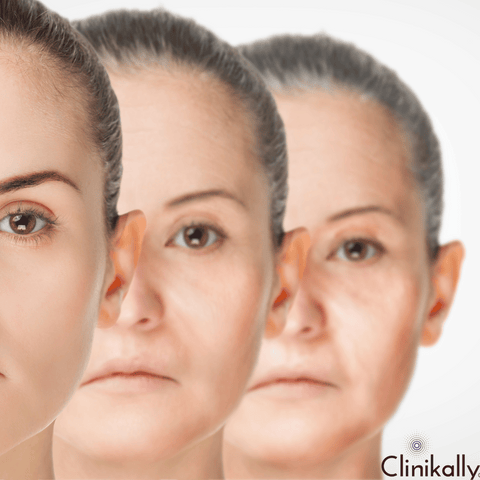
Anti-aging techniques are essential in any climate, especially humid settings. Indeed, humid conditions can provide special challenges for aging skin, such as increased moisture retention and the possibility of plugged pores. Here are some anti-aging strategies for humid settings to consider:
-
Sunscreen is essential: Protecting your skin from the sun's harmful UV rays is critical for anti-aging. UV radiation can cause skin damage, even in humid settings. Apply a broad-spectrum sunscreen with at least SPF 30 every day and reapply every two hours, especially if you spend time outside. Look for lightweight, oil-free formulas or mineral-based sunscreens.
-
Antioxidant-rich skincare: Incorporate antioxidant-rich products into your skincare routine. Antioxidants shield your skin from free radicals, which cause premature aging. Look for serums or moisturizers that contain vitamins C, E, green tea extract, or resveratrol.
-
Hydration without heaviness: It is critical to balance hydration in humid environments without overburdening the skin with heavy products. Look for lightweight moisturizers or hydrating serums that hydrate the skin while still allowing it to breathe. Hyaluronic acid is an excellent ingredient for retaining moisture while remaining lightweight.
-
Gently exfoliate: Exfoliating on a regular basis removes dead skin cells and stimulates cell turnover, resulting in a more youthful appearance. However, in humid climates, it is important to avoid over-exfoliation, which can cause skin irritation. Choose gentle exfoliants, such as chemical exfoliants containing AHAs (alpha hydroxy acids) or BHAs (beta hydroxy acids), and limit exfoliation to once or twice a week.
-
Oil-free and non-comedogenic skincare products: Choose oil-free and non-comedogenic skincare products to avoid clogged pores and breakouts in humid climates. These formulations will not add unnecessary oils or aggravate skin oiliness. Look for labels that state "oil-free" or "non-comedogenic."
-
Maintain a healthy diet: A diet rich in antioxidants, vitamins, and minerals can help to maintain healthy skin and fight aging. Consume plenty of fruits and vegetables, whole grains, lean proteins, and healthy fats. Stay hydrated by drinking plenty of water throughout the day.
-
Eye care: The delicate skin around the eyes is susceptible to aging. To address issues such as fine lines, wrinkles, and puffiness, use an eye cream or serum designed specifically for the eye area. Look for products that are lightweight and easily absorbed.
-
Stress management: Chronic stress can accelerate the aging process and affect the appearance of your skin. Exercise, meditation, or engaging in hobbies that you enjoy are all effective stress management techniques. Adequate sleep is also essential for maintaining youthful skin.
-
Treatments and procedures: Professional treatments and procedures may be considered depending on your specific concerns and preferences. Consult a dermatologist or aesthetician about options such as chemical peels, microdermabrasion, laser treatments, or injectables such as Botox or dermal fillers. These can help with fine lines, wrinkles, and other aging signs.
-
Consistency and patience: Remember that anti-aging efforts require consistency and patience. Results might not show up right away, so to support healthy, youthful-looking skin, it is crucial to keep up a committed skincare routine and lifestyle habits.
Humidity's Impact on Skin Aging
Humidity can have an impact on skin aging in both positive and negative ways. Here are some examples of how humidity can influence the aging process:
-
Hydration: There is typically more moisture in the air in humid environments, which can help keep the skin hydrated. Adequate hydration is essential for skin elasticity and the prevention of fine lines and wrinkles.
-
Increased moisture retention: Humidity can aid in the retention of moisture in the skin, resulting in a plumper and more supple appearance. Moisture retention can help you look younger by reducing the visibility of fine lines and wrinkles.
-
Clogged pores: On the other hand, high humidity can cause increased sweating and excess sebum production, both of which can contribute to clogged pores. Acne, blackheads, and whiteheads can form as a result of clogged pores, making the skin appear dull and aged.
-
Potential for fungal or bacterial infections: Humidity fosters the growth of fungi and bacteria. This can increase the risk of skin infections or aggravate pre-existing skin conditions like eczema or psoriasis, both of which can contribute to premature aging.
-
Sensitivity and irritation: Some people are more sensitive and irritable in humid environments. This can cause inflammation, redness, and discomfort, potentially hastening the aging process.
-
Impact on collagen and elastin: Humidity has no direct effect on collagen and elastin production, which are required for skin firmness and elasticity. However, excessive exposure to high humidity combined with other environmental factors like UV radiation or pollution can contribute to collagen breakdown and accelerated aging.
Maintaining a well-rounded skincare routine is essential to mitigating the potential negative effects of humidity on skin aging:
-
Regularly cleanse your skin to remove excess oil, sweat, and impurities.
-
Use light moisturizers and hydrating serums to keep your skin hydrated without clogging your pores.
-
Use a broad-spectrum sunscreen to protect your skin from UV rays.
-
Gently exfoliate to remove dead skin cells and promote cell turnover.
-
Stay cool by using fans or staying in air-conditioned environments.
-
Avoid using harsh skincare products that can deplete the skin's natural moisture barrier.
-
Keep hydrated by drinking plenty of water.
-
Consider using antioxidant-rich products to combat free radicals and protect your skin.
-
Consult a dermatologist if necessary for personalized advice and treatment options.
By maintaining a balanced skincare routine and being mindful of the potential effects of humidity, you can help minimize the impact of humidity on skin aging and promote a healthier, more youthful complexion.
Protecting Your Skin from Environmental Factors in High Humidity
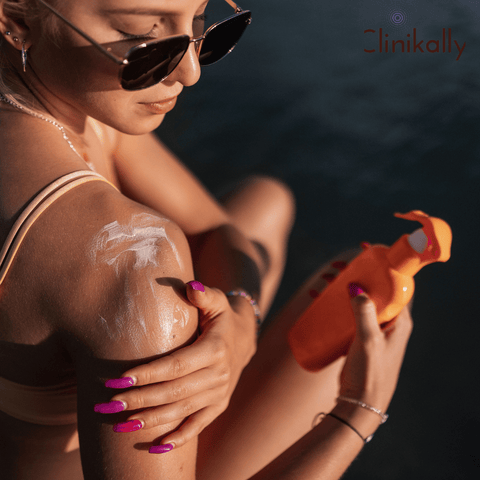
To maintain the health of your skin and avoid a variety of skin conditions, it is essential to protect it from outside factors when the humidity is high. Here are some suggestions to help you safeguard your skin in such situations:
-
Wear sunscreen: Shielding your skin from UV rays is only possible by using sunscreen. Apply a broad-spectrum sunscreen liberally to all exposed skin areas, even on cloudy days, with an SPF of at least 30. Reapply at least once every two hours, or more often if you are swimming or perspiring.
-
Seek shade: Avoid being in the sun's direct path between 10 a.m. and 4 p.m., when it is most intense. Look for shade or make your own with a hat, umbrella, or lightweight clothing.
-
Keep hydrated: High humidity can lead to increased sweating and skin moisture loss. Drink a lot of water throughout the day to stay hydrated. This promotes overall skin health and aids in preserving the skin's moisture balance.
-
Use breathable, light-weight materials: Choose clothing made of natural fibres like cotton or linen that is both breathable and light-weight. These materials promote airflow and support skin respiration, preventing sweat from adhering to the skin.
-
Cleanse your skin on a regular basis: Cleaning your skin removes sweat, dirt, and impurities that can accumulate in humid conditions. Use a gentle cleanser that is appropriate for your skin type, and cleanse your face and body on a regular basis. Avoid using harsh or drying cleansers, which can remove natural oils and disrupt the skin's barrier function.
-
Moisturise properly: Regardless of the humidity, it is critical to keep your skin moisturized. Look for hydrating serums or lightweight, oil-free moisturizers that provide hydration without feeling heavy or greasy. To lock in moisture, apply moisturizer to damp skin.
-
Use antioxidant-rich products: Antioxidants help protect your skin from free radicals caused by environmental factors such as pollution and UV radiation. To strengthen your skin's defence against environmental damage, look for skincare products that contain antioxidants such as vitamin C, vitamin E, green tea extract, or resveratrol.
-
Avoid wearing heavy makeup: In humid weather, heavy makeup can clog pores and increase sweat and oil production. Choose makeup that is lightweight, oil-free, and non-comedogenic. Consider tinted moisturizers or mineral-based foundations with SPF for lighter coverage.
-
Keep your skin clean and dry: After engaging in sweat-inducing activities, thoroughly clean your skin to remove any sweat, dirt, or bacteria. Damp skin in humid conditions can be a breeding ground for bacteria, potentially leading to skin problems.
-
Consider using oil-absorbing products: If you have oily skin or struggle with excess shine in high humidity, oil-absorbing products can help control the oiliness. To keep your skin looking fresh all day, look for oil-free primers, mattifying powders, or blotting papers.
Optimizing Your Skincare Routine for Anti-Aging in Humid Climates
In humid areas, optimizing your skincare routine for anti-aging entails balancing hydration, protection, and particular anti-aging elements. Cleanse gently, hydrate effectively, use antioxidants, and UV protection, exfoliate regularly, target specific concerns, use moisturizing masks and sheet masks, do eye care, change your regimen as needed, and consult a skin care professional to optimize your routine. Remember to stick to your skincare program and give it time to produce results. Sun protection, hydration, and the use of specific anti-aging products are all important parts of optimizing your skincare regimen for anti-aging in humid regions.
Conclusion
Maintaining healthy, youthful-looking skin in humid regions necessitates a well-rounded skincare regimen that is adapted to the unique difficulties and characteristics of such environments. While humidity has some advantages, such as enhanced hydration and moisture retention, it can also cause clogged pores, increased sensitivity, and potential skin problems. To counteract these impacts, make sun protection a priority by applying sunscreen and seeking shade during peak hours. Using lightweight, oil-free, and non-comedogenic products can also help avoid blocked pores and breakouts. Antioxidants, moderate exfoliation, and particular anti-aging components can address specific symptoms while also protecting against environmental damage. The key to optimizing your skincare regimen for anti-aging in humid areas is maintaining hydration, washing your face thoroughly, and changing your routine as necessary. Finally, consulting a skincare expert can offer individualized guidance and support based on your skin type, problems, and the particular humid environment in which you live. By using these strategies and maintaining your skincare regimen, you can protect your skin from environmental aggressors, reduce premature aging, and foster a healthy, youthful complexion even in humid environments.









































